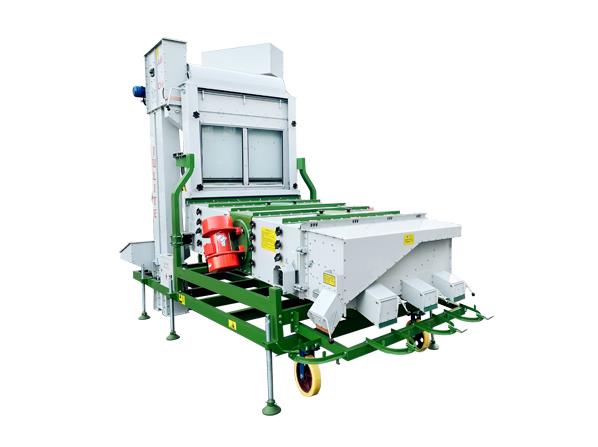Grain cleaning is a critical post-harvest process that removes impurities, debris, and damaged grains, ensuring higher quality and longer storage life. For small-scale farmers, investing in the right cleaning equipment offers several benefits:
✅ Improved Grain Quality: Removes dirt, chaff, and broken kernels.
✅ Higher Market Value: Clean grains fetch better prices.
✅ Reduced Post-Harvest Losses: Minimizes mold, pests, and spoilage.
✅ Efficient Seed Cleaning: Ensures pure, healthy seeds for replanting.
When selecting cleaning machines, small-scale farmers should consider:
Capacity: Choose machines suitable for small-scale production (100 – 1000 kg/hour).
Grain Compatibility: Ensure the equipment works with various grains (wheat, rice, maize, barley, etc.).
Portability: Compact, mobile units for easy transport and storage.
Power Source: Electric or manually operated, depending on local electricity availability.
Cost and Maintenance: Budget-friendly, low-maintenance machines.
1. Air Screen Cleaner
Description:
An air screen cleaner uses air suction and vibrating screens to separate grains from light impurities (dust, husks) and heavier particles (stones).
Capacity:
✅ Small models: 200 – 1000 kg/hour
✅ Medium models: 1000 – 3000 kg/hour
Features:
✅ Two-step cleaning process:
Air suction removes light debris.
Screens filter out larger impurities.
✅ Adjustable screen sizes: Suitable for different grains.
✅ Compact and portable: Easy to move and operate.
Best for:
Wheat, rice, maize, barley, millet, and soybeans.
Advantages:
Highly efficient for cleaning grains and seeds.
Compact and easy to operate.
Low energy consumption.

2. Vibrating Grain and Seed Cleaner
Description:
A vibrating grain cleaner uses oscillating motion and multiple sieves to separate grains by size and weight.
Capacity:
✅ Small models: 100 – 500 kg/hour
✅ Medium models: 500 – 1500 kg/hour
Features:
✅ Multi-layer screens: Filters grains by size and removes foreign particles.
✅ Adjustable speed and vibration: Customizable for different grains.
✅ Compact design: Ideal for small-scale operations.
Best for:
Rice, maize, wheat, sunflower seeds, and beans.
Advantages:
Efficient removal of impurities and broken grains.
Easy to use and maintain.
Low power consumption.
3. Gravity Separator
Description:
A gravity separator uses air flow and vibration to separate grains by density, removing lighter impurities, damaged kernels, and foreign particles.
Capacity:
✅ Small models: 300 – 1000 kg/hour
✅ Medium models: 1000 – 3000 kg/hour
Features:
✅ Precise separation: Removes low-density grains and impurities.
✅ Adjustable air flow and vibration: Ensures accurate cleaning.
✅ Compact design: Suitable for small farms.
Best for:
Wheat, barley, oats, corn, and legumes.
Advantages:
High cleaning efficiency.
Compact and easy to operate.
Low power consumption.
4. Manual Hand-Crank Grain Cleaner
Description:
A manual hand-crank grain cleaner is a non-electric, manually operated machine. It uses a rotating drum or sieve to separate grains from impurities.
Capacity:
✅ 50 – 200 kg/hour
Features:
✅ Hand-powered: No electricity required.
✅ Portable and lightweight: Easy to transport and store.
✅ Adjustable sieves: Compatible with various grain sizes.
Best for:
Wheat, maize, rice, and small grains.
Advantages:
Cost-effective for small-scale farmers.
Ideal for off-grid or rural areas.
Low maintenance.
5. Rotary Drum Grain Cleaner
Description:
A rotary drum cleaner uses rotating perforated drums to separate grains from impurities based on size and weight.
Capacity:
✅ Small models: 300 – 1500 kg/hour
✅ Medium models: 1500 – 4000 kg/hour
Features:
✅ Rotary motion: Removes chaff, dust, and straw.
✅ Adjustable drum sizes: Suitable for different grains.
✅ Compact and efficient: Easy to use on small farms.
Best for:
Corn, wheat, soybeans, and rice.
Advantages:
High cleaning efficiency.
Portable and easy to operate.
Suitable for multiple grain types.
6. Small-Scale Combined Grain Cleaner and Grader
Description:
A combined cleaner and grader performs multi-functional grain cleaning by removing impurities and grading grains based on size.
Capacity:
✅ 300 – 1500 kg/hour
Features:
✅ Two-step cleaning and grading:
Removes dust, stones, and chaff.
Grades grains by size.
✅ Adjustable screen layers: For different grain types.
✅ Portable design: Ideal for small farms.
Best for:
Wheat, rice, corn, barley, and millet.
Advantages:
Efficient dual-function cleaning and grading.
Compact and easy to operate.
Time-saving and cost-effective.
| Equipment | Capacity | Grain Types | Power Source | Best For | Advantages |
| Air Screen Cleaner | 200 – 3000 kg/hour | Wheat, rice, maize, barley | Electric | Small and medium farms | High cleaning efficiency |
| Vibrating Grain Cleaner | 100 – 1500 kg/hour | Rice, maize, wheat, beans | Electric | Multi-grain operations | Low maintenance |
| Gravity Separator | 300 – 3000 kg/hour | Wheat, barley, oats, legumes | Electric | Precision separation | High efficiency |
| Manual Hand-Crank Cleaner | 50 – 200 kg/hour | Wheat, maize, rice | Manual | Off-grid use | No electricity needed |
| Rotary Drum Cleaner | 300 – 4000 kg/hour | Corn, wheat, soybeans, rice | Electric | Large batches | Fast and efficient cleaning |
| Combined Cleaner & Grader | 300 – 1500 kg/hour | Wheat, corn, rice, barley | Electric | Cleaning and grading combo | Dual-function efficiency |
For small-scale farmers, the air screen grain cleaner and the vibrating grain cleaner offer the best balance of efficiency, affordability, and ease of use. These machines provide:
High cleaning efficiency for various grains.
Compact, portable designs ideal for small farms.
Low maintenance and operating costs.
Tip: For farmers in off-grid areas, a manual hand-crank grain cleaner is an excellent low-cost and electricity-free option.
Processing demand survey
x